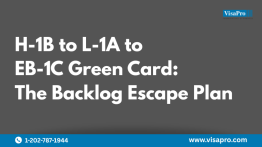On August 2, 2011, the Obama Administration and USCIS outlined a series of initiatives to continue to promote start-up enterprises and spur job creation in the U.S. Under these initiatives, which are aimed at stimulating investment in the U.S., qualified entrepreneurs, including sole employees, can now utilize the H1B visa to establish and run a business in the U.S. temporarily. Further, qualified entrepreneurs can also seek permanent resident status through the EB-2 category, either through the labor certification process or through the National Interest Waiver (NIW) category.
These initiatives significantly enhance the visa options that would be available to an alien entrepreneur desirous of setting up an enterprise in the U.S. and running it, both temporarily and as a permanent resident. While categories like the E-1/E-2 Treaty/Trader visa, L-1A visa and the EB-5 Investment Green Card continue to be a good option for many investors and entrepreneurs, these categories remain elusive for nationals of certain countries, those who do not necessarily have business or companies abroad, and those who have money to invest but cannot meet the high threshold set out for the EB-5 program. For the benefit of our readers, we present a synopsis of these initiatives, focusing on the H1B visa and EB-2 Green Card options, as they apply to an alien entrepreneur.
A. H1B Visas for Entrepreneurs
Under the new initiatives, USCIS has clarified its policies on the important aspect of ‘employer-employee relationship’ for H1B purposes for individuals with an ownership interest in their own companies. These individuals, even if they are the sole employee may be able to establish the necessary employer-employee relationship to obtain an H1B visa if they can demonstrate that the company has the independent right to control their employment. Thus, USCIS cannot deny a petition solely because the beneficiary of the petition is the only employee or because he or she has an ownership in the company.
USCIS has clarified that a corporation is a separate legal entity from its stockholders or sole owner, and a corporation may petition for, and hire, their principal stockholders as H1B temporary employees. The facts must show that there is an independent right to control by the petitioner over the employment of the beneficiary. Only then can a valid employer-employee relationship be established. For example, if the petitioner provides evidence that there is a separate Board of Directors which has the ability to hire, fire, pay, supervise or otherwise control the beneficiary, the petitioner may be able to establish an employer-employee relationship with the beneficiary.
While many practitioners have argued for many years that this approach should be allowed under the regulations, it is anticipated that with this new initiative, some restrictions that had limited the ability of entrepreneurs to qualify for H1B visa have been relaxed.
To know more about the impact of these initiatives on the H1B visa, please read the Q&As here.
B. EB-2 Green Card for Entrepreneurs
Under the new initiatives, USCIS has also explained how entrepreneurs may obtain an Employment-Based Second Preference (EB-2) Immigrant Visa if they satisfy the existing requirements within the current confines of the immigrant visa categories. The EB-2 visa classification includes foreign workers with Advanced Degrees and individuals of Exceptional Ability in the arts, sciences, or business.
An entrepreneur can qualify as a member of a profession holding an Advanced Degree if:
- He or she will be working for a U.S. employer who files a petition on his or her behalf;
- He or she is a member of the profession holding an advanced degree or foreign equivalent degree;
- The underlying position requires, at a minimum, a professional holding an advanced degree or the equivalent;
- The petitioning employer has received a certified labor certification from the Department of Labor; and
- He or she meets all the specific job requirements listed on the individual labor certification.
Note: Not every individual with an Advanced Degree will qualify. It must be demonstrated that the occupation is a ‘profession’. Regulations define ‘profession’ as any occupation for which a U.S. baccalaureate degree or its foreign equivalent is the minimum requirement for entry into the occupation. Occupations include but are not limited to architects, engineers, lawyers, physicians, surgeons, and teachers in elementary or secondary schools, colleges, academics, or seminaries.
An entrepreneur can qualify as an individual of Exceptional Ability in the sciences, arts, or business if:
- He or she will be working for a U.S. employer who files a petition on his or her behalf;
- He or she has exceptional ability in the sciences, arts, or business;
- He or she will be working in the field of exceptional ability;
- He or she will substantially benefit prospectively the national economy, cultural or educational interests, or welfare of the United States;
- The petitioning employer has received an individual labor certification from the Department of Labor; and
- He or she meets all the specific job requirements listed on the individual labor certification.
Note: Regulations define Exceptional Ability as degree of expertise significantly above that ordinarily encountered in the sciences, arts, or business.
It is still unclear if and how the Department of Labor will relax its own regulations regarding the sole ownership/shareholder issue.
To know more about the EB-2 Green Card for entrepreneurs, please read the Q&As here.
C. EB-2 Green Card National Interest Waiver (NIW) for Entrepreneurs
Generally, an EB-2 visa petition, as above, requires a job offer and a Department of Labor certification. One or both of these requirements can be waived under existing law if the petitioner demonstrates that approval of the EB-2 visa petition would be in the national interest of the United States. A National Interest Waiver (NIW) under the EB-2 category exempts the petitioner from the normal requirement of a job offer, and thus from obtaining a labor certification from the U.S. Department of Labor.
Under the new initiatives of USCIS, entrepreneurs may qualify for a National Interest Waiver (NIW) under the EB-2 immigrant visa category if they can demonstrate that their business endeavors will be in the interest of the United States, that their activities will substantially benefit the national economy, cultural or education interests or welfare of the United States.
Further, under the NIW category, an entrepreneur may be able to self-petition as an advanced degree professional or exceptional ability foreign national without the need for a job offer or labor certification. However, to file for a NIW, the entrepreneur must first demonstrate that he or she is either a member of the profession holding an advanced degree or an individual of exceptional ability.
USCIS has further clarified that for a National Interest Waiver under the EB-2 category:
- The entrepreneur must seek employment in an area that has substantial intrinsic merit. It is important for the entrepreneur to focus on the proposed employment rather than the entrepreneur’s qualifications.
- The entrepreneur must demonstrate that the proposed benefit to be provided will be national in scope. The entrepreneur might be able to demonstrate that the jobs his or her business enterprise will create in a discrete locality will also create (or “spin off”) related jobs in other parts of the nation. Or, the entrepreneur might be able to establish that the jobs created locally will have a positive national impact.
- The entrepreneur must present a significant benefit to the field of endeavor and must document how the entrepreneurial enterprise will benefit that field.
An entrepreneur who demonstrates that his or her business enterprise will create jobs for U.S. workers or otherwise enhance the welfare of the United States may qualify for an NIW. USCIS has explained that while the requirements of the NIW visa category have not necessarily been relaxed, it hopes that the new initiative opens the door to new immigration options for entrepreneurs.
To know more about the EB-2 National Interest Waiver for entrepreneurs, please read the Q&As here.
Conclusion
As mentioned above, these initiatives will be extremely helpful for individuals who cannot qualify for the E-1 or E-2 visas because their countries are not a “treaty” country and for individuals who do not have companies abroad to qualify for the L-1 visa. Also, entrepreneurs do not necessarily have to secure $500,000 to $1,000,000 in order to qualify for the EB-5 immigrant visa.
Foreign entrepreneurs who want to start a company in the U.S. may now become eligible for an H1B visa or an EB-2 Green Card as entrepreneurs, if otherwise qualified.
VisaPro, a leader in employment-based U.S. immigration and nationality law can help you navigate these exciting new opportunities. VisaPro has specialized expertise in guiding companies and individuals who want to establish and grow their business in the U.S. VisaPro has the tools you need to not only navigate the immigration maze, but also to assist you in actually establishing your business. We have assisted individuals from all over the world establish businesses and invest all throughout the U.S.
Contact VisaPro to set up a consultation with an experienced immigration attorney if you have any questions regarding the H1B Visa, EB-2 Green Card, EB-2 NIW, EB-5 Green Card and the entrepreneur initiative. We will be happy to guide you through the process.
We cover the latest happenings on Start-up visas in Immigration Monitor, our monthly newsletter. Click here to subscribe to Immigration Monitor.




